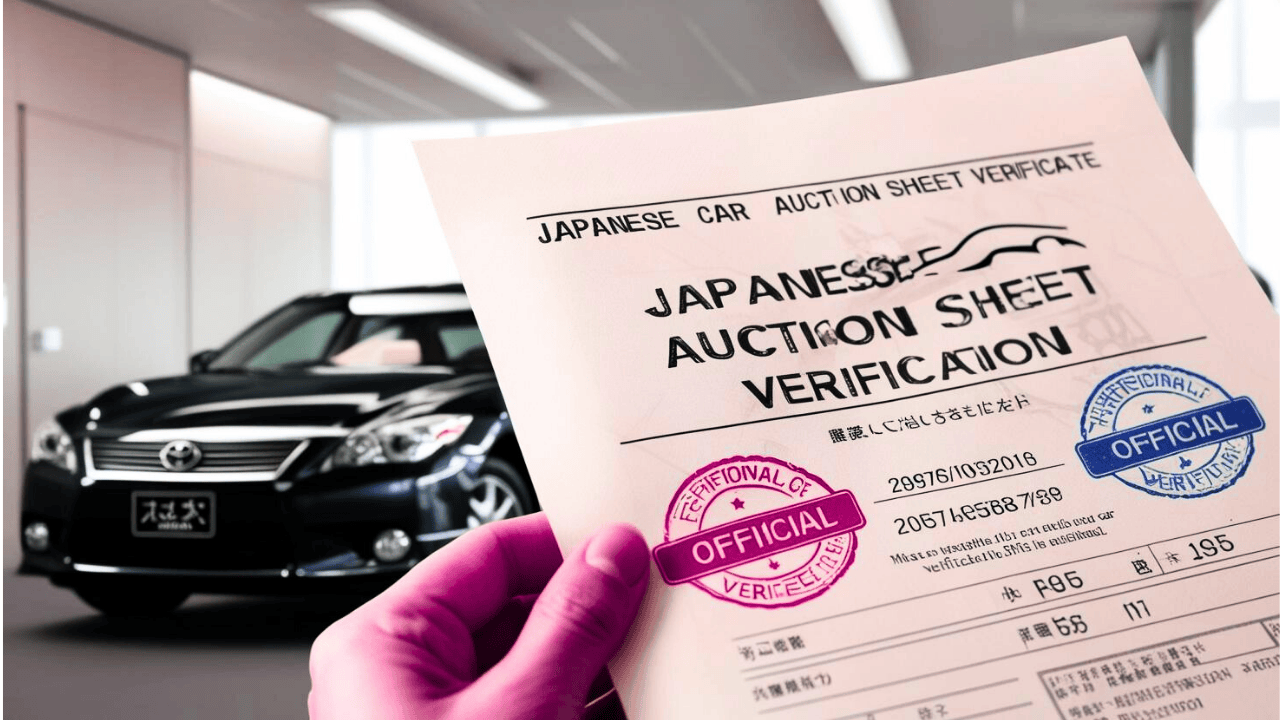
Japan Auction Sheet Verification
Want to buy a car from Japan? You need to check the auction sheet! Japan auction sheet verification helps you avoid scams when buying Japanese cars. Many people get tricked with fake papers. This guide shows how to spot real auction sheets and protect yourself when buying cars from Japan.
What Is a Japan Auction Sheet?
A Japan auction sheet is a report card for used cars in Japan. It shows:
- The car's grade (how good it is)
- How many miles it has driven
- Any damage or repairs
- Engine condition
- Interior quality
When cars are sold in Japan's big car auctions, each car gets this sheet. Dealers and buyers use these sheets to know the true condition of cars before buying them.
Why Japan Auction Sheet Verification Matters
Checking if an auction sheet is real is super important! Here's why:
- Stop scammers: Some sellers change the numbers to make cars look better
- Know the truth: See if the car was in accidents
- Get what you pay for: Make sure the car matches what the seller claims
- Save money: Avoid buying problem cars that will cost more later
One wrong car buy can cost thousands of dollars in repairs!
5 Step How to Japan Auction Sheet Verification
Follow these steps to check if your Japan auction sheet is real:
- Check the auction house name
- Look for big names like USS, TAA, JU, or ARAI
- Each auction house has its own sheet style
- Learn the codes and grades
- Grades range from "S" (perfect) to "R" (major problems)
- Interior grades use A, B, C (A is best)
- Look at damage marks
- Auction sheets show damage with letters and numbers
- A1 = small scratch, W2 = dent with repair, etc.
- Use translation tools
- Most sheets are in Japanese
- Apps like Google Translate can help
- Check the numbers
- Make sure the mileage matches other documents
- Verify the VIN (car ID number)
Learn more about buying cars at Japan auctions
Common Japan Auction Sheet Scam Tricks
Be careful! Scammers use these tricks:
- Photoshop changes: They edit the sheet to remove damage marks
- Changed miles: They lower the mileage to make the car seem less used
- Better grades: They change the grade from 3 to 4.5 to charge more
- Hidden problems: They don't tell you about rust or water damage
The most common trick is changing the mileage. A car with 100,000 miles might be sold as having only 50,000 miles!
Tools & Websites for Japan Auction Sheet Verification
These tools can help you check auction sheets:
Online Verification Services
- JDM Export
- JapaneseVehicles.com
- BE FORWARD
VIN Check Tools
- carVertical
- Japan VIN Check
Image Tools
- Google Images (for reverse image search)
- Car Auction Report
Using more than one tool gives you better results. Don't rely on just one source!
How to Spot a Fake Japan Auction Sheet
Real auction sheets have special marks that fakes often miss:
|
Feature |
Real Sheet |
Fake Sheet |
|
Watermark |
Clear, visible when tilted |
Missing or poorly copied |
|
Auction House Logo |
Sharp, official |
Blurry or wrong colors |
|
Handwritten Marks |
Natural writing style |
Too perfect or missing |
|
Damage Diagram |
Detailed, matches photos |
Too clean or missing marks |
|
Paper Quality |
Special auction paper |
Regular printer paper |
Check auction bid history to verify information
Using Third-Party Auction Sheet Verification Services
Not sure about checking yourself? Get expert help:
- Professional checkers: Pay $20-50 for expert verification
- Dealer services: Some dealers offer free checks if you buy from them
- Online services: Websites can check auction history
The cost of expert help is small compared to buying a bad car!
Japan Auction Sheet Grades Explained
Understanding grades helps you know the car's true value:
Overall Grades
- S: Showroom new (rare)
- 6: Less than 1 year old, perfect
- 5: Perfect condition
- 4.5: Very good with tiny issues
- 4: Good used car
- 3.5: Average with some problems
- 3: Below average, needs work
- 2: Poor condition
- 1: Very poor
- R: Accident car with frame damage
Interior Grades
- A: Like new
- B: Good, small wear
- C: Average, visible wear
- D: Poor, stains or damage
Special Markings
- ★: One owner car
- ◆: Rare or special model
- !: Warning about a serious issue
What to Do If Your Auction Sheet Seems Fake
Found a fake? Take these steps:
- Stop the deal right away
- Ask for more proof (service history, other photos)
- Try checking the VIN number
- Report the seller to car buying websites
- Look for other cars with real sheets
Never send money for a car with a suspicious auction sheet!
List of Reputable Japan Auction Houses
Trust sheets from these big auction houses:
- USS (Used car System Solutions): Japan's biggest car auction
- TAA (Toyota Auto Auctions): Run by Toyota
- JU (Japan Used car dealers Association): National dealer network
- ARAI: Popular in eastern Japan
- HAA (Hokkaido Auto Auction): Northern Japan specialist
Each has its own sheet style, but all follow strict rules.
FAQs About Japan Auction Sheet Verification
What is a Japan auction sheet?
A Japan auction sheet is a report for used cars. It shows car condition, grades, and damage. Used by buyers to check vehicle history.
Can auction sheets be faked?
Yes, some auction sheets are fake. Scammers change grades or hide damage. Always verify before buying a used car.
How can I tell if an auction sheet is genuine?
Check for watermarks, stamps, and dealer details. Compare with car photos. Fake sheets often look blurry or edited.
Is there an app to verify Japan auction sheets?
Yes, apps like CarVX or Vinaudit can help. They scan and check auction sheet details. Some apps translate Japanese too.
Can I verify the auction sheet myself?
Yes, match the car details with photos. Look for signs of repair. Ask an expert if unsure about the auction grade.
What does "R" grade mean on an auction sheet?
"R" grade means the car was repaired. It had major damage before. Check carefully before buying an R-grade car.
Are all Japan auction sheets in Japanese?
Most auction sheets are in Japanese. Some dealers translate them. Use apps or experts to read them correctly.
Do all Japanese used cars have auction sheets?
No, some used cars are sold privately. But most dealers provide auction sheets for transparency. Always ask for one.
Extra Tips for Safe Japan Car Buying
Besides checking the auction sheet, remember:
- Ask for more photos of the actual car
- Check if window tinting has been added (might hide problems)
- Look for the best Japanese car auction sites with good reviews
- Get a friend who knows Japanese to help if possible
- Start with cheaper cars until you learn the system
Conclusion
Japan auction sheet verification is your best defense against scams when buying Japanese cars. By learning to spot real sheets, understanding grades, and using the right tools, you can find great cars at fair prices.
Remember: always check the auction sheet, verify the details, and don't rush your purchase. A little time spent checking now saves big problems later!
Ready to find your dream Japanese car? Start by learning the auction sheet basics, and you'll shop with confidence!
Tags
japan car auction sheet varification, carauction reportAlso Read

Japan Auction Sheet Verification
Professional Japan Auction Sheet Verification – avoid fraud, confirm vehicle specs, and get a true assessment of auction sheet details. ...
| 21/05/25

How to Buy a Car in Japan Auction
How to Buy a Car in Japan Auction with steps on bidding, inspection, payment, and shipping process for secure and ...
| 29/04/25

how much does window tinting cost
Find out how much does window tinting cost based on vehicle type, tint quality, and installation method. Compare prices and ...
| 28/04/25

Car Auction Bid History: Unlocking the Secrets to Smarter Bidding
Car Auction Bid History with real-time updates on bids, winning amounts, and buyer interest. Track past and current auction activity ...
| 24/04/25

what is the best japanese car auction site
what is the best japanese car auction site ...
| 15/04/25